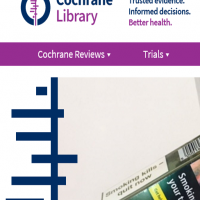
National one-click access to evidence-based Cochrane Reviews: increasing healthcare benefit and reducing harms and costs
The South African Medical Research Council (SAMRC) aims to improve the quality of healthcare for South Africans. The SAMRC’s Cochrane Centre recently procured a national Cochrane Library licence that will make evidence-based scientific reviews accessible to healthcare decision makers in South Africa.
This collaboration between Wiley and the SAMRC offers free access, through IP recognition, to the Cochrane Library throughout South Africa. This has been made possible by funding from the SAMRC and will enable all South Africans to access the gold-standard in evidence-based healthcare research. The national licence commenced in June 2017.
“This licence means that healthcare practitioners will have sustained access to reliable and unbiased Cochrane Reviews in order to apply well-informed decisions at the point of care to deliver quality healthcare to patients”, says Cochrane South Africa Director, Professor Charles Wiysonge. “We also know that systematic reviews of the evidence, such as those produced by Cochrane, can guide decision makers in the development of policies and clinical practice guidelines.”
Although some universities and hospitals have had access to the Cochrane Library, by way of institutional subscriptions, most healthcare practitioners are not directly affiliated with these institutions leaving access to the Cochrane Library largely unavailable in clinical settings. Similarly, government technical teams and healthcare workers, responsible for developing and implementing policies and guidelines, have limited access to the Cochrane Library and therefore do not always have easy access to evidence-based information for decision making.
“A national licence for South Africa will ensure that all those looking for reliable, up-to-date evidence on healthcare interventions, would have simple ‘one-click’ access without discrimination,” says SAMRC President, Professor Glenda Gray. “This will be of specific benefit to the many doctors and nurses working under less than ideal circumstances in rural and remote areas of South Africa.”
Cochrane Reviews provide reliable and unbiased evidence through the identification, assessment, synthesis and dissemination of research findings. The Cochrane Library houses over 7000 systematic reviews. The national licence in South Africa will provide students, practitioners, researchers and patients with one-click access to this leading resource in evidence-based research. Subject areas include pregnancy, mental health, cancer, paediatric care, surgical procedures, public health, plus many more.
Who can access the library?
All South African residents who need to make a health-related decision will have one-click access.
Who will benefit?
Making a healthcare decision based on best-available evidence will benefit anyone who uses the Cochrane Library, this might include – civil society, healthcare providers, policy makers, managers and educators, students and parents.
What is Cochrane evidence and how can it help you?
Cochrane Reviews are systematic reviews of primary research in healthcare and health policy. They investigate the effects of interventions for prevention, treatment and rehabilitation. They are published online in the Cochrane Library.
A systematic review addresses a clearly formulated question; for example: Can antibiotics help in alleviating the symptoms of a sore throat?
To answer this question, we search for and collate all the existing primary research on the topic that meets certain criteria; then we assess it using stringent guidelines, to establish whether or not there is conclusive evidence about a specific treatment.
Cochrane Reviews are peer reviewed, dynamic and updated regularly. This ensures that treatment decisions can be based on the most up-to-date, reliable evidence.
